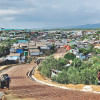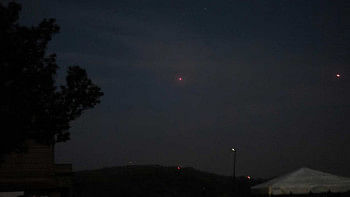Rohingya inflow: Strain on already crammed camps

The refugee camps in Cox's Bazar have become overwhelmed with the recent inflow of Rohingyas arriving since November 2023, with authorities now scrambling to arrange accommodation and food for them.
More than 1.6 lakh Rohingyas have fled to Bangladesh over the past year or so, a reliable government source at the camps told The Daily Star.
As such, managing housing has become a major challenge for officials at the already overcrowded camps in Teknaf and Ukhiya upazila.
The Rohingyas continue to flee Myanmar's Rakhine State to escape various forms of oppression allegedly committed by the Arakan Army, a rebel group that now controls over 80 percent of Rakhine following more than a year of intense fighting with junta forces.
Earlier, before December 8 last year, Rohingyas were fleeing to Bangladesh to escape the war between the Arakan Army and the military junta, both of whom targeted the Rohingyas.
These new arrivals have joined the nearly 12 lakh Rohingyas already residing in Bangladesh, majority of whom fled a brutal military crackdown in 2017.
Mohammad Jasim, a majhi (community leader) of Camp 26, said biometric registration has been completed for around 8,000 of the newly arrived Rohingyas at his camp, while another 8,000 are still awaiting the process. In the meantime, all new arrivals have received food assistance tokens.
"There's now a huge struggle for accommodation. Many are staying with relatives in already overcrowded shanties. Some have cut down trees and razed hills in Teknaf to make space for shelters."
Refugee Relief and Repatriation Commissioner (RRRC) Md Mizanur Rahman said of the new arrivals, biometric registration for 1.15 lakh refugees has been completed as of yesterday, and the process is ongoing.
When asked about the number of food ration tokens distributed, the RRRC declined to disclose the figure, citing duplication issues and the inclusion of some Bangladeshis in the list, which are currently being resolved.
He added that struggling to accommodate the new arrivals, authorities initially decided to house them in unused community shelters and available spaces within the camps.
During a visit to Camps 25, 26, and 27 yesterday, many new Rohingyas were seen living in makeshift shelters wherever space was available. In some areas, trees were cut and hills razed to build temporary homes. Others were staying with relatives, crammed into small tarpaulin-covered huts.
Khanjada Shahriar Bin Mannan, camp in-charge of Camps 24, 25, and 27, said there is no space left in those three camps and that the new arrivals are now moving toward the Ukhiya camps in search of shelter.
Karim Ullah, a Rohingya man who arrived at Camp 26 with his six-member family on April 11 after a difficult journey from Maungdaw in Rakhine, said there is no space for separate accommodation for his family, so he is currently bunched up with relatives.
A former community leader, Karim said his home was burnt down by the Arakan Army, which is hunting community leaders and educated individuals.
"They are picking up young people to fight on the front line against the junta without proper training. Many have been detained, accused of links to the junta, ARSA, or RSO. Some were tortured, some are missing, and others were killed."
Karim also alleged that the Arakan Army restricts livelihood opportunities and access to food while imposing heavy tolls on everyday activities.
"They are making our lives unbearable so that we leave the country," he said grimly, adding that returning to Rakhine in the current situation is not an option.

 For all latest news, follow The Daily Star's Google News channel.
For all latest news, follow The Daily Star's Google News channel. 








Comments